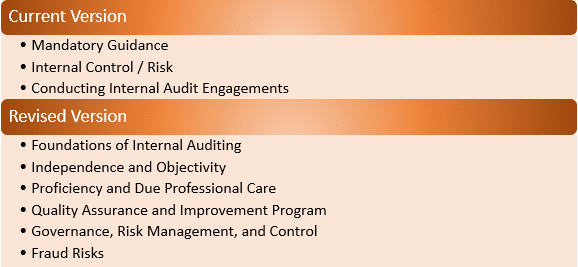In January 2018, the Institute of Internal Auditors (IIA) announced major changes to the Certified Internal Auditor (CIA) exam. In this post, we’ll cover the why, when, and what of the CIA Exam changes, and how you can properly prepare yourself to pass the new exam.
Why is the CIA Exam Changing?
Internal audit practices change over time to reflect new technology and better practices. To keep up with this change and reflect relevantly on the profession, the exam also has to change. In a press release by the IIA announcing the updates to the CIA Exam, the IIA noted they conducted a job analysis study by reaching out to professionals in the field with a variety of job titles. The results of this study showed a disconnect between the exam material and the evolution of the profession. Therefore, the IIA revised the exam to make it more relevant to today’s internal audit position.
When are CIA Exam Changes Taking Effect?
The revised CIA exam will be released in January of 2019 for English-speaking candidates. For those who need to take the exam in another language, the IIA is working with global affiliates to transition to additional languages during 2019. The current CIA exams offered in non-English languages will be used during 2019 until the CIA exam changes are offered in a specific language. Then the old version of the exam in that specific language will no longer be available. You can see the availability dates for non-English exams here.
What Exactly Is Changing?
1. New Goals
The IIA noted the following new goals for the CIA exam:
- To have the three parts of the exam balanced, clear and uniform.
- To minimize duplication and overlap among exam parts.
- To be aligned with the IIA’s International Standards for the Professional Practice of Internal Auditing
- To be up-to-date with the current global practice of internal auditing
- To cover the knowledge, skills and abilities candidates need to have in order to be the best internal auditors possible.
2. An Introduction of Difficulty Levels
Items within the syllabi will be assigned a cognitive, or difficulty, level. The two levels are below:
- The Basic Level which tests memory and comprehension
- The Proficient Level which gauges how candidates can apply, analyze and evaluate information.
By reviewing which level applies to which item in the syllabi, candidates can better plan study time. Surgent’s A.S.A.P. technology will also help candidates plan study time, and turn weak syllabi areas into strengths.
3. Syllabi Updates
Part I: Essential of Internal Auditing
The Current Version of the exam has three main sections covering a broad number of topics. The Revised Version will have six sections which are narrower in structure.
Current Version:
- Mandatory Guidance
- Internal Control/Risk
- Conducting Internal Audit Engagements
Revised Version:
- Foundations of Internal Auditing
- Independance and Objectivity
- Proficiency and Due Professional Care
- Quality Assurance and Improvement Program
- Governance, Risk Management, and Control
- Fraud Risks
Part II: Practice of Internal Auditing
The Current Version of the exam, again, takes a broad stroke in the three topics. The Revised Version places a greater emphasis on the planning and performance of the engagement within its four topics.
Current Version:
- Managing the Internal Audit Function
- Managing the Individual Engagements
- Fraud and Risk Controls
Revised Version:
- Managing the Internal Audit Activity
- Planning the Engagement
- Performing the Engagement
- Communicating Engagement Results and Monitoring Progress
Part III: Business Knowledge for Internal Auditing
Unlike Parts I and II, Part III has fewer topics in the Revised Version of the Exam. The Current Version focuses more on business structure, corporate governance and ethics in its eight topics while the Revised Version is more IT focused within its four topics.
Current Version:
- Governance/Business Ethics
- Risk Management
- Organizational Structure/Business Processes and Risks
- Communication
- Management/Leadership Principles
- IT/Business Continuity
- Finanicial Management
- Global Business Environment
Revised Version:
- Business Accumen
- Information Security
- Information Technology
- Financial Management
Unchanged Parts of the Exam
The number of questions and time allotted will continue to be the same as below:
- Part 1 will have 125 questions and last 150 minutes.
- Part 2 will have 100 questions and last 120 minutes.
- Part 3 will have 100 questions and last 120 minutes.
Candidates will also continue to meet the same eligibility requirements below:
- Bachelor’s degree or equivalent.
- Character reference from a responsible person.
- Work experience – 24 months of internal audit experience; a Master’s degree can substitute for 12 of the 24 months.
The registration process, administration of the exam and exam fees remain unchanged.
How You Can Prepare for the New Exam
The CIA exam underwent a complete overhaul, with the new exam becoming more technical and focused on the realities of being an internal auditor. Surgent’s CIA Review will prepare you for that overhaul with updated study materials reflecting the new exam. We also feature Predictive AI Technology(TM), an adaptive learning technology that individualizes your study time, giving you the most effective and efficient test prep experience. With our Pass Guarantee and reduced study times, Surgent’s CIA Review is the perfect tool to help you obtain your CIA credential.





